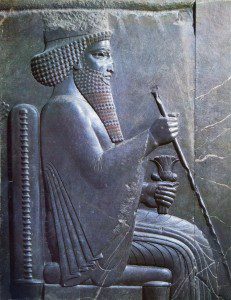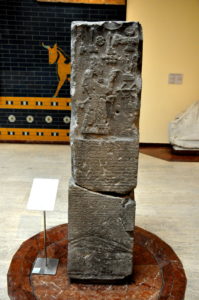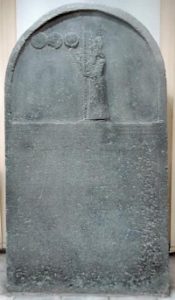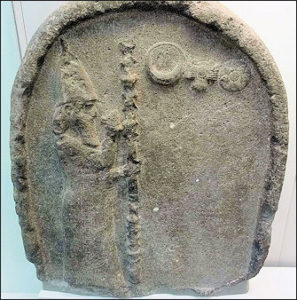http://www.sacred-texts.com/ane/rp/rp201/rp20138.htm
(Texts: All Artifacts, Color Coding, & Writings in Bold Type With Italics Inside Parenthesis, are Added by Editor R. Brown, not the Authors, Translators, or Publishers!)
(gods in blue)
1. Barachiel is a slave of ransom 1 belonging to Gagâ the daughter of
 (giant semi-divine king Nebuchadnesser II, 605-562 B.C.)
(giant semi-divine king Nebuchadnesser II, 605-562 B.C.)
2 …… whom in the 35th year of Nebuchadnezzar, king of Babylon, 2
3. [from Akhi-]nuri, the son of Nabu-nadin-akh, for the third of a mina and 8 shekels
4. she had bought. Recently 3 he has instituted an action, saying thus: I am the son of a (noble) ancestor, of the family 4 of Bel-rimanni,
5. who have joined the hands (in matrimony) of Samas-mudammiq the son of Nabu-nadin-akh
6. and the woman Qusadu the daughter of Akhi-nuri, even I. In the presence of

 (Nabonidus & his inscriptions on 2 ancient stelai)
(Nabonidus & his inscriptions on 2 ancient stelai)
7. the high-priest, 5 the nobles and the judges of Nabonidus king of Babylon
8. they pleaded the case and listened to their arguments in regard to the obligation of servitude
9. of Barachiel. From the 35th year of Nebuchadnezzar king of Babylon
 (Nabonidus & symbols of gods, ruled Babylon 556-539 B.C.)
(Nabonidus & symbols of gods, ruled Babylon 556-539 B.C.)
10. to the 7th year of Nabonidus king of Babylon, 6 he had been sold for money, had been put
11. in pledge, (and) as the dowry of Nubtâ the daughter
12. of Gagâ had been given. Afterwards Nubtâ had alienated him by a sealed contract; 7
13. in exchange for a house and slaves to Zamama-nadin
14. her son and Idinâ her husband had given him. They read (the evidence) and
15. said thus to Barachiel: Thou hast brought an action and said: The son of a (noble) ancestor
16. am I. Prove to us thy (noble) ancestry. Barachiel his former statement
17. retracted, saying: Twice have I run away from the house of my master, but many people (were present),
18. and 1 I was seen. I was afraid and said (accordingly) that I am the son of a (noble) ancestor.
19. My citizenship exists not; I am the slave of ransom of Gaga.
20. Nubtâ her daughter received me as (her) dowry; Nubtâ
21. alienated me by a sealed contract, and to Zamama-nadin her son and Idinâ 2 her husband
22. gave me in exchange; and after the death of Gagâ (and) Nubtâ,
23. to Itti-Marduk-baladh the son of Nabu-akhe-iddin of the family of Egibi, for silver
24. I [was sold]. I am a slave. Go now, [pronounce sentence] about me.
25. [The high-priest], the nobles and the judges heard the evidence
26. [and] restored [Barachiel] to his condition as slave of ransom, notwithstanding the absence of Samas-mudammiq
27. [the son of Nabu-nadin-akh] and Qudasu the daughter of Akhi-nuri, the seller 3
28. [of the slave]. For the registration of this [decision] Musezib the [priest]
29. [and] Nergal-akhe-iddin the judges
30 of the family of Epis-el, in the city of the palace of the king of Babylon, the 17th day of
31. the month Marchesvan 1 [the 7th? year] of Nabonidus king of Babylon.
Footnotes
156:1 The father of Akhi-nuri was Nabu-nadin-akh (“Nebo (Nabu) gives a brother”), and the father of the son-in-law bears the same name. But it is by no means certain that the uncle married his niece, since the two persons may have been different.
156:2 It would be a useful work to collect the names of all the banû or ancestors, men of noble birth, like Egibi, Nur-Sin, and others.
160:1 For the meaning of this expression see above, p. 158.
160:2 B.C. 590.
160:3 Ana eninni, not a proper name as Dr. Revillout supposes!
160:4 Read lu zir. Several distinguished persons were called Bel-rimanni, among others a priest of the Sun-god.
160:5 Sangu.
160:6 B.C. 549.
160:7 The text does not seem to me to have been correctly copied here.
161:1 Not ka.
161:2 Such names are all, I think, emphatic imperatives: Idinâ, “give!” Basâ, “exist!” Iribâ, “multiply!” Considering the Aramaic transcription of the last name, we ought perhaps to pronounce Idinai, Basai.
161:3 Nadinan, a singular noun with the same termination as makhiranu, “the buyer;” masikhanu, “the measurer;” paqiranu, “the plaintiff;” napalkattanu, “the defendant.”
162:1 October.